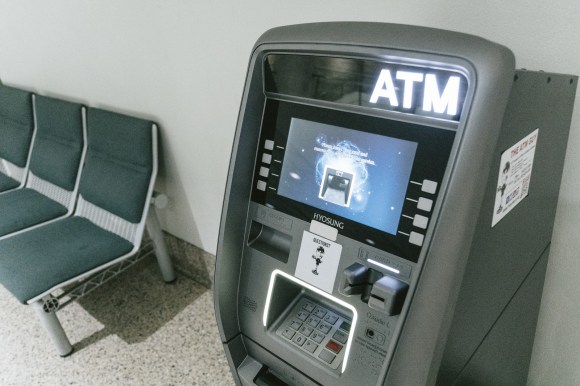
Things that “can’t be helped” in Japan, but are maybe a little different elsewhere in the world.
One of my favorite Japanese phrases is shikata ga nai. Translated, it means “it can’t helped” and it’s used in a variety of situations, such as when your laundry pile has finally reached the ceiling and you’ve worn the same pair of underwear for four days (“It can’t be helped… I actually have to do laundry now”), or when you’re starving and there’s only six-day-old sushi and ketchup in the fridge (“It can’t be helped… I am going to go where no taste buds have gone before.”)
But the shikata ga nai situations that I like the best are the ones that seem to exist specifically in Japan. They’re the things that, if they were to happen in the U.S. for example, people wouldn’t just say “oh well it can’t be helped,” they’d rip off their red-white-and-blue shirts and scream “FREEDOM!” until whatever it was that couldn’t be helped, could be helped.
That’s why today I’m counting down my top five “shikata ga nai” situations in life in Japan. All of these come from my personal experience, so other people’s mileage may vary, but I feel like they tend to happen here more often than other places.
So let’s get to it! Starting off with…
Honorable Mention: Prices
I’m lucky enough to live nearby a very nice butcher shop in Japan. I go there to buy my weekly chicken and occasionally splurge on some pork or beef when I’m feeling fancy. One time I wanted to make chicken curry, and the recipe called for 400 grams of chicken thigh meat. So I asked the guy at the counter for 400 grams.
The conversation went something like this:
Me: “I’d like 400 grams of chicken thigh please.”
Him: “Chicken thigh meat is only sold in units of 300 grams.”
Me: “Wait, what?”
Him: “Do you want 300 grams or 600 grams?”
Me: “Well 300 is too little and 600 is too much, can you just cut it?”
Him: “No, we don’t cut chicken thighs.”
Me: “But you cut the chicken breasts and tenderloins I order all the time.”
Him: “Sorry, but we don’t cut chicken thighs.”
Me: “Well…guess it can’t be helped then can it?”
I know this sounds like I’m making a big deal out of nothing (and to be fair, I am, which is why this is only an honorable mention), but I feel like this “can’t be helped’ situation rarely happens in other countries like the U.S. where the customer’s inner bald eagle would swoop out and break free at the slightly-inconvenient injustice of it all.
▼ The recipe calls for 400 grams of chicken thighs and ten gallons of FREEDOM!
GUESS I CAN’T GET THAT HERE EITHER, HUH?
#5. Photography
If you’re a fan of taking photos at performance events, then you may be surprised in Japan when you’re told to put away your smartphone or camera at concerts and other shows.
While copyright infringement is part of the reasoning, another part is being courteous to others at the event so that people holding their phones above their heads don’t block the view of others.
▼ And yet no one bothers to ban toddlers sitting on top of their parents’ shoulders!
Yet another thing those mini-humans get away with….
もうすぐ端午の節句。今は肩車も軽々出来ちゃうけど、僕もパパみたいにでっかくて強くて、優しい男になるんだ!#端午の節句 #初節句 #かぶと #こどもの日 #そうしゃかん #創寫舘 #名古屋 #愛知 #鶴舞 #カメラマン #フォトグラファー#photographer #写真 #子供 pic.twitter.com/9rxjIMZqhC
— 名古屋の写真館_創寫舘鶴舞本店 (@soshakanturumai) April 15, 2017
I was at a comedy show at a local mall that a friend of mine was doing in Japan once, and there were signs everywhere that said “no photos allowed.” But being the dumb American that I was, I figured just one little snapshot from the back with my phone wouldn’t hurt anyone.
As soon as my phone went up in the air, with speed that still shocks me to this day, an attendant in white gloves dashed over and told me to put my phone away. I’ve never been more ashamed of trying to outsmart a shikata ga nai situation in my life.
To be fair, this is kind of a considerate rule to have, thus its low ranking on the list. But when you go to an event and really want to take a photo to forever remember it by, all you can do is sigh and say “it can’t be helped.”
#4. Going home time
Japan is a country that is very punctual about starting times. But on the other hand, one thing it is usually not very punctual about is ending times… as in, “end of the workday” times.
When I worked at city hall in Japan it was a common occurrence for guests and meetings to be scheduled near or at closing at 5:00. Whenever I would ask why they scheduled these meetings (which we all had to attend) so late instead of earlier in the day when we were literally sitting around with nothing else to do, all I would get for a response is: “it can’t be helped.”
Perhaps some of those times it legitimately “couldn’t be helped,” but considering these were the same people who told me that they couldn’t go home before their boss went home because “it couldn’t be helped” either, I was fairly skeptical.
▼ “Dude, it’s 6 a.m. Did… you spend the night at work?”
“Yeah.”
“Could that ‘not be helped’ either?”
“I guess, yeah.”
#3. Schedules
前アカで毎月描いてたねこぎんひじカレンダー一覧。またやりたい〜 #ねこぎんひじ pic.twitter.com/E45mXX8Qw2
— ちぇぶさん (@7776_709) March 18, 2017
Oh city hall in Japan, the source of most of my silly shikata ga nai situations.
At city hall, we had air conditioning. This was great in the hot summer, but it came with a catch: the schedule for the air conditioning was fixed. It was turned on April 1, no matter how cool it was, and it was shut off October 1, no matter how hot it was.
I remember sitting at my desk in the office on October 1, sweating to death with all the windows in the building open, more fans spinning than there were people on the floor, because it was still blisteringly hot outside.
When I asked my coworkers why we couldn’t keep the air conditioner on (since it was just as hot as yesterday when we did have it on), the only response I got was, of course, “that’s just how the schedule is, it can’t be helped.”
▼ Me, the rest of the day, silently stewing at
my desk, only with a lot more sweat involved.
#2. Extra costs
One of the biggest shikata ga nai situations in the U.S. that I hear about from foreign friends is how display prices in the U.S. don’t have tax included. So when you pick up a video game for $9.99, and then the cashier rings it up as something like $10.50, unless you know what’s going on, you might think you’ve been cheated.
In Japan, the prices plus tax are often displayed, but there are other costs that “can’t be helped” which can be somewhat infuriating.
For example when I signed up for my phone, I was told that I would be billed on the 20th of every month. Since I signed up on the 12th, I asked if that meant my first bill would only be for eight days, and I was told no, it would be for a full month.
Feeling the screeching eagle inside me yearning to breathe free, I asked if this was something “that couldn’t be helped,” and I got a nod from the clerk. I asked if I could come back on the 20th and sign up then, and then actually get a whole month of service before I paid for a month, and I was told that would be fine. But not wanting to go a week without a phone, I grumbled and signed the papers.
▼ I’ll pay the full-month price for only eight days, but you’d better believe
I’ll be making this face the whole time I’m using the phone!
Another common extra cost that “can’t be helped” is key money – money given as a “gift” to the landlord when you sign a lease for an apartment. It’s usually one to three month’s rent, and unlike a security deposit, you don’t get it back at the end of your lease.
Key money isn’t as common today as it was years ago, but it does still exist, and the first apartment I had in Japan had a one-month key money fee when I signed the lease. I’ll bet you can guess the question I asked them about it.
▼ Hint – it rhymed with “So it can’t be Yelped?”
“Yelp- A Great Business Networking Site among Top 10 #Socialmedia for Local Marketing and SEO
— Social SEO Blogging (@SocialBookmarx) March 19, 2017
” https://t.co/xn8UQhXm5L pic.twitter.com/Cr0BenTrkf
And the #1 thing that “can’t be helped” in Japan is…
.
.
.
.
.
.
.
.
.
.
1. Cash problems
The first shikata ga nai situation is that Japan is still very much a cash society. Debit cards and credit cards aren’t widely accepted in less-developed and rural areas. So if you want to go out with friends but you forgot to hit up the ATM, unfortunately you staying home tonight “can’t be helped.”
But wait, you may be thinking, can’t you just hop over to the ATM and withdraw some cash?
Depending on the time/day, that might not be possible. For example where I live in rural Japan, the ATM is only open Mondays to Friday until 6:00 p.m. and only to 2:00 p.m. on Sundays. If you need cash outside of those times, sorry, it can’t be helped.
▼ That feel when you’re standing outside of the closed ATM.
So close, yet so far.
Of course there are some workarounds to this. Shopping centers usually have generic ATMs that can withdraw cash from most banks, but you’ll have to pay a fee to use it. Or if you’re lucky enough to live nearby a train station, you can always use your credit/debit card to load money onto a prepaid Suica/Pasmo card, and then go and use that card at a location that accepts them.
But still, the whole time you’re walking out of your way to go to the station just so you can use one card to load money onto another card, you’ll probably be grumbling to yourself about why the stores couldn’t just accept your debit/credit card in the first place. But you’ll know the answer is because…
▼ “…it can’t be helped.”
Gah! But my inner freedom-eagle is protesting so loudly!
So there you have it, my top five Japanese “shikata ga nai’s.” What kind of situations in Japan have made you, or people around you, say “it can’t be helped?” Let us know in the comments, and if one them was your teacher telling you to memorize one of the top five kanji with the longest readings, then hey, props to you!
Top image: PAKUTASO (edited by SoraNews24)
W.T.F. Japan will be back next Thursday. In the meantime, give me a follow on Twitter and let me know if there’s any topics you’d like to see covered. See you next week!










 W.T.F. Japan: Top 5 best Tamagotchi releases 【Weird Top Five】
W.T.F. Japan: Top 5 best Tamagotchi releases 【Weird Top Five】 W.T.F. Japan: Top 5 nicest sounds in Japan【Weird Top Five】
W.T.F. Japan: Top 5 nicest sounds in Japan【Weird Top Five】 W.T.F. Japan: Top 5 strange things Japanese people do for Christmas【Weird Top Five】
W.T.F. Japan: Top 5 strange things Japanese people do for Christmas【Weird Top Five】 W.T.F. Japan: Top 5 hardest Japanese habits to break 【Weird Top Five】
W.T.F. Japan: Top 5 hardest Japanese habits to break 【Weird Top Five】 W.T.F. Japan: Top 5 kanji with the longest readings 【Weird Top Five】
W.T.F. Japan: Top 5 kanji with the longest readings 【Weird Top Five】 Starbucks Japan releases first-ever Hinamatsuri Girls’ Day Frappuccino
Starbucks Japan releases first-ever Hinamatsuri Girls’ Day Frappuccino Drift ice in Japan is a disappearing winter miracle you need to see now
Drift ice in Japan is a disappearing winter miracle you need to see now Japan Extreme Budget Travel! A trip from Tokyo to Izumo for just 30,000 yen [Part 2]
Japan Extreme Budget Travel! A trip from Tokyo to Izumo for just 30,000 yen [Part 2] Sync! Illumination lets you watch Tokyo Disneyland Electrical Parade from home on multiple phones
Sync! Illumination lets you watch Tokyo Disneyland Electrical Parade from home on multiple phones 566 million yen in gold bars donated to Japanese city’s water bureau
566 million yen in gold bars donated to Japanese city’s water bureau Japanese video 18-Year-Old Grandpa has important, moving message behind its silly-sounding title
Japanese video 18-Year-Old Grandpa has important, moving message behind its silly-sounding title Photos from 140 years ago show Tokyo’s skyline was amazing long before the Skytree was ever built
Photos from 140 years ago show Tokyo’s skyline was amazing long before the Skytree was ever built Shin Godzilla trailer released, hits very close to home【Video】
Shin Godzilla trailer released, hits very close to home【Video】 Top 100 manga of all time chosen by survey of 150,000 Japanese people
Top 100 manga of all time chosen by survey of 150,000 Japanese people Which convenience store onigiri rice balls are the most popular? Survey reveals surprising results
Which convenience store onigiri rice balls are the most popular? Survey reveals surprising results Highest Starbucks in Japan set to open this spring in the Tokyo sky
Highest Starbucks in Japan set to open this spring in the Tokyo sky The 10 most annoying things foreign tourists do on Japanese trains, according to locals
The 10 most annoying things foreign tourists do on Japanese trains, according to locals Tokyo Skytree turns pink for the cherry blossom season
Tokyo Skytree turns pink for the cherry blossom season Yakuzen ramen restaurant in Tokyo is very different to a yakuza ramen restaurant
Yakuzen ramen restaurant in Tokyo is very different to a yakuza ramen restaurant Shibuya Station’s Hachiko Gate and Yamanote Line stairway locations change next month
Shibuya Station’s Hachiko Gate and Yamanote Line stairway locations change next month Starbucks Japan releases new sakura goods and drinkware for cherry blossom season 2026
Starbucks Japan releases new sakura goods and drinkware for cherry blossom season 2026 Starbucks Japan adds new sakura Frappuccino and cherry blossom drinks to the menu
Starbucks Japan adds new sakura Frappuccino and cherry blossom drinks to the menu Japan Extreme Budget Travel! A trip from Tokyo to Izumo for just 30,000 yen [Part 1]
Japan Extreme Budget Travel! A trip from Tokyo to Izumo for just 30,000 yen [Part 1] Japan’s new “Cunte” contact lenses aren’t pronounced like you’re probably thinking they are
Japan’s new “Cunte” contact lenses aren’t pronounced like you’re probably thinking they are Japan’s newest Shinkansen has no seats…or passengers [Video]
Japan’s newest Shinkansen has no seats…or passengers [Video] Foreigners accounting for over 80 percent of off-course skiers needing rescue in Japan’s Hokkaido
Foreigners accounting for over 80 percent of off-course skiers needing rescue in Japan’s Hokkaido Super-salty pizza sends six kids to the hospital in Japan, linguistics blamed
Super-salty pizza sends six kids to the hospital in Japan, linguistics blamed Starbucks Japan unveils new sakura Frappuccino for cherry blossom season 2026
Starbucks Japan unveils new sakura Frappuccino for cherry blossom season 2026 Foreign tourists in Japan will get free Shinkansen tickets to promote regional tourism
Foreign tourists in Japan will get free Shinkansen tickets to promote regional tourism Take a trip to Japan’s Dododo Land, the most irritating place on Earth
Take a trip to Japan’s Dododo Land, the most irritating place on Earth Naruto and Converse team up for new line of shinobi sneakers[Photos]
Naruto and Converse team up for new line of shinobi sneakers[Photos] Is China’s don’t-go-to-Japan warning affecting the lines at a popular Tokyo gyukatsu restaurant?
Is China’s don’t-go-to-Japan warning affecting the lines at a popular Tokyo gyukatsu restaurant? Survey asks foreign tourists what bothered them in Japan, more than half gave same answer
Survey asks foreign tourists what bothered them in Japan, more than half gave same answer Japan’s human washing machines will go on sale to general public, demos to be held in Tokyo
Japan’s human washing machines will go on sale to general public, demos to be held in Tokyo Starbucks Japan releases new drinkware and goods for Valentine’s Day
Starbucks Japan releases new drinkware and goods for Valentine’s Day We deeply regret going into this tunnel on our walk in the mountains of Japan
We deeply regret going into this tunnel on our walk in the mountains of Japan Studio Ghibli releases Kodama forest spirits from Princess Mononoke to light up your home
Studio Ghibli releases Kodama forest spirits from Princess Mononoke to light up your home Major Japanese hotel chain says reservations via overseas booking sites may not be valid
Major Japanese hotel chain says reservations via overseas booking sites may not be valid Put sesame oil in your coffee? Japanese maker says it’s the best way to start your day【Taste test】
Put sesame oil in your coffee? Japanese maker says it’s the best way to start your day【Taste test】 No more using real katana for tourism activities, Japan’s National Police Agency says
No more using real katana for tourism activities, Japan’s National Police Agency says W.T.F. Japan: Top 5 ways to get rid of the annoying door-to-door NHK guy 【Weird Top Five】
W.T.F. Japan: Top 5 ways to get rid of the annoying door-to-door NHK guy 【Weird Top Five】 W.T.F. Japan: Top 5 crazy awesome features of Japanese restaurants 【Weird Top Five】
W.T.F. Japan: Top 5 crazy awesome features of Japanese restaurants 【Weird Top Five】 W.T.F. Japan: Top 5 most hilarious Japanese euphemisms 【Weird Top Five】
W.T.F. Japan: Top 5 most hilarious Japanese euphemisms 【Weird Top Five】 W.T.F. Japan: Top 5 strangest Japanese home goods【Weird Top Five】
W.T.F. Japan: Top 5 strangest Japanese home goods【Weird Top Five】 W.T.F. Japan: One year anniversary special! Top 5 W.T.F. Japan articles 【Weird Top Five】
W.T.F. Japan: One year anniversary special! Top 5 W.T.F. Japan articles 【Weird Top Five】 W.T.F. Japan: Top 5 confusing Japanese Internet slang words 【Weird Top Five】
W.T.F. Japan: Top 5 confusing Japanese Internet slang words 【Weird Top Five】 W.T.F. Japan: Top 5 confusing Japanese hand gestures【Weird Top Five】
W.T.F. Japan: Top 5 confusing Japanese hand gestures【Weird Top Five】 W.T.F. Japan: Top 5 strangest ways to be polite in Japan 【Weird Top Five】
W.T.F. Japan: Top 5 strangest ways to be polite in Japan 【Weird Top Five】 W.T.F. Japan: Top 5 offensive Japanese insults【Weird Top Five】
W.T.F. Japan: Top 5 offensive Japanese insults【Weird Top Five】 W.T.F. Japan: Top 5 most annoying sounds in Japan 【Weird Top Five】
W.T.F. Japan: Top 5 most annoying sounds in Japan 【Weird Top Five】 W.T.F. Japan: Top 5 reasons sleeping on the floor Japanese-style is awesome 【Weird Top Five】
W.T.F. Japan: Top 5 reasons sleeping on the floor Japanese-style is awesome 【Weird Top Five】 W.T.F. Japan: Top 5 myths about learning Japanese【Weird Top Five】
W.T.F. Japan: Top 5 myths about learning Japanese【Weird Top Five】 W.T.F. Japan: Top 5 biggest Japanese food challenges【Weird Top Five】
W.T.F. Japan: Top 5 biggest Japanese food challenges【Weird Top Five】 W.T.F. Japan: Top 5 strange Japanese office occurrences【Weird Top Five】
W.T.F. Japan: Top 5 strange Japanese office occurrences【Weird Top Five】 W.T.F. Japan: Top 5 craziest Japanese certification exams 【Weird Top Five】
W.T.F. Japan: Top 5 craziest Japanese certification exams 【Weird Top Five】 W.T.F. Japan: Top 5 creepiest Japanese animals 【Weird Top Five】
W.T.F. Japan: Top 5 creepiest Japanese animals 【Weird Top Five】